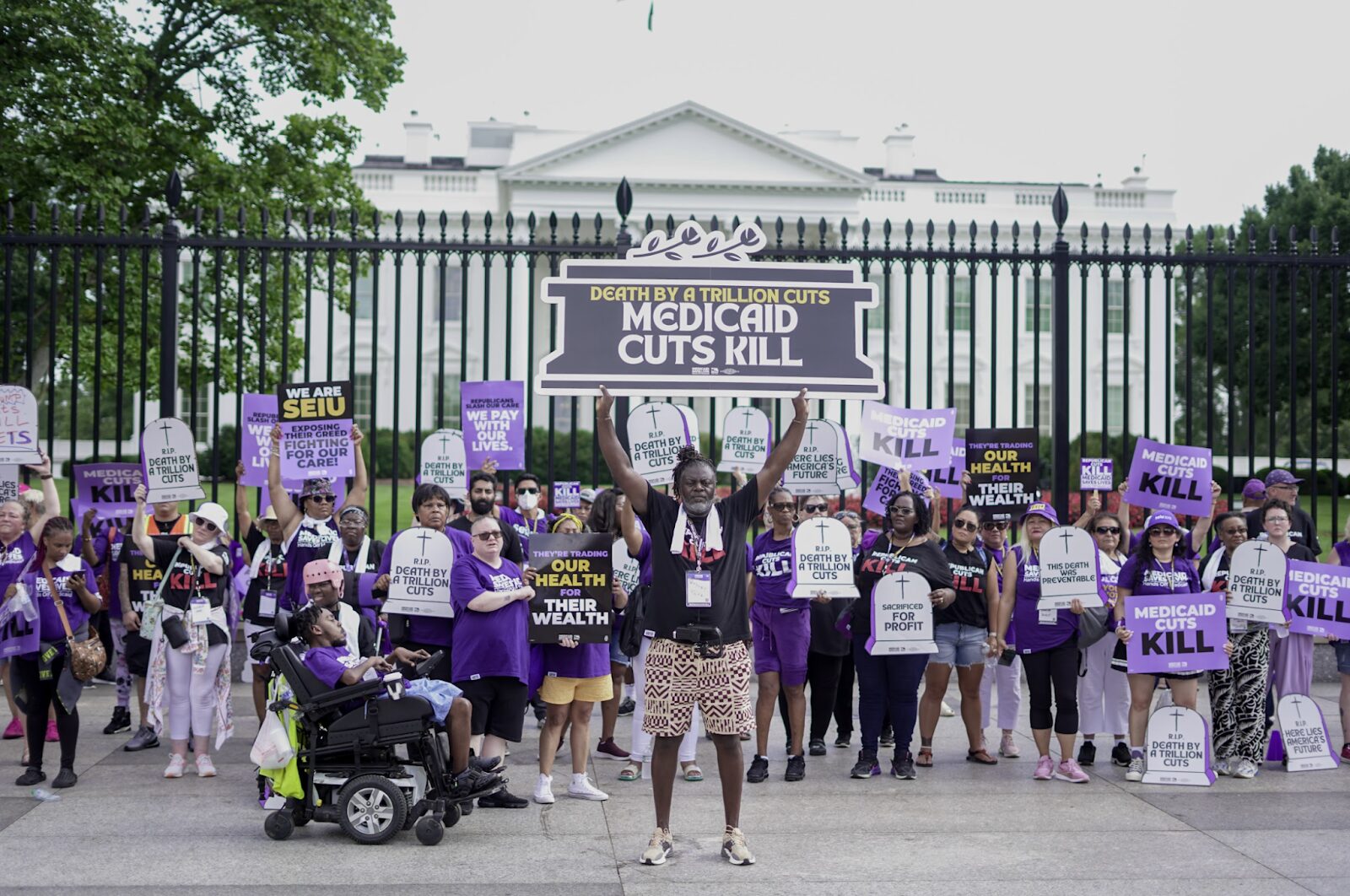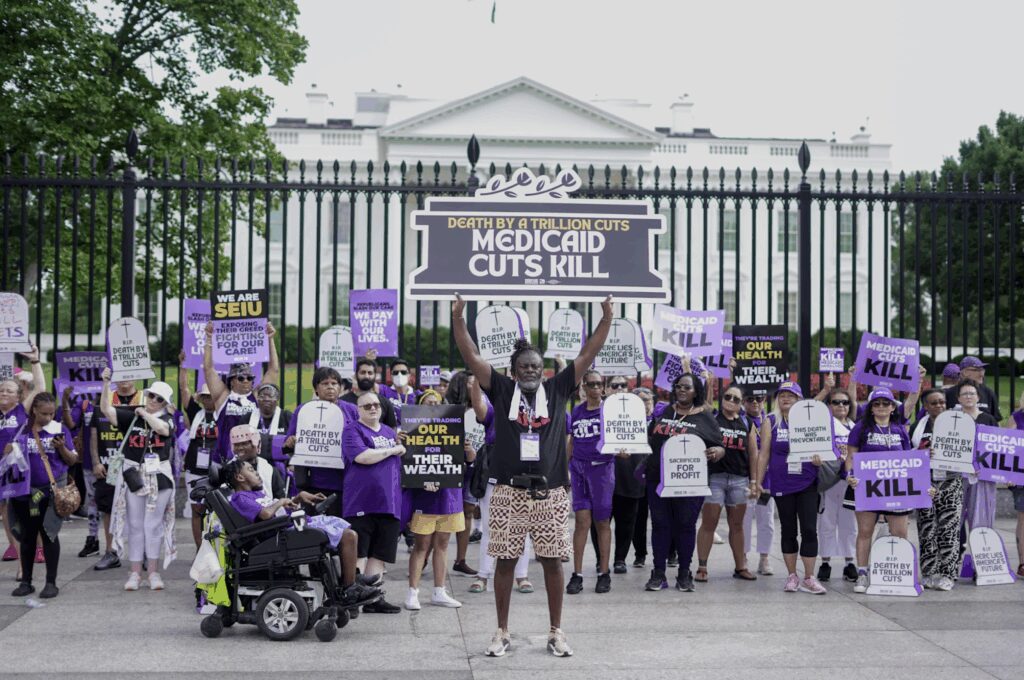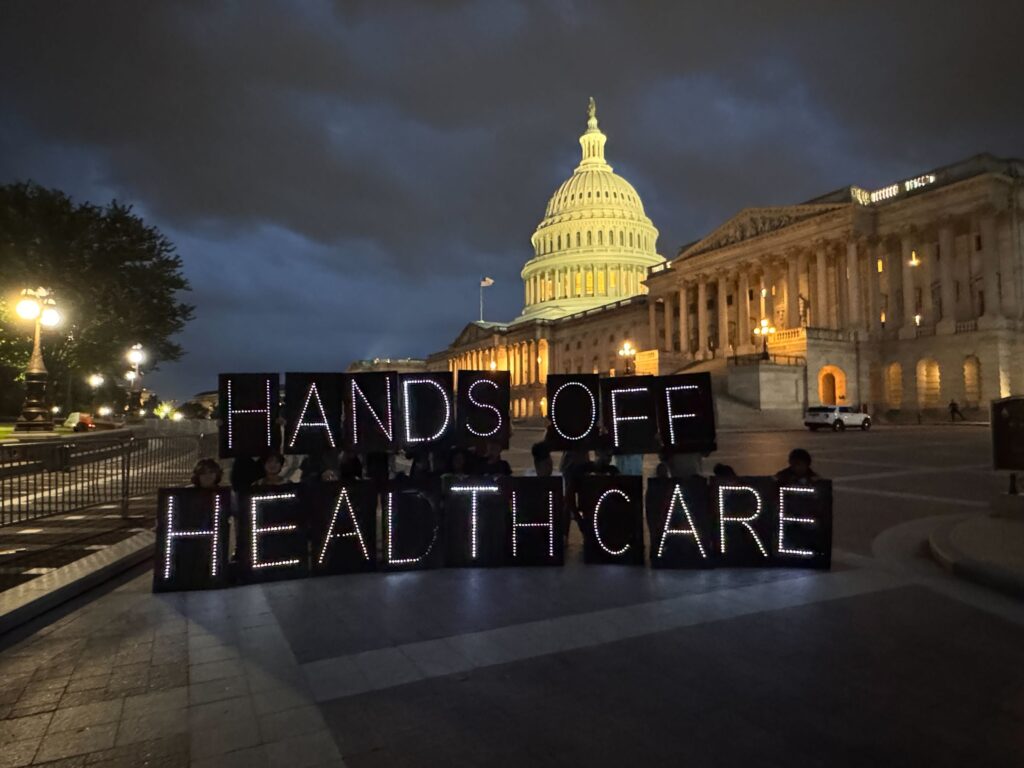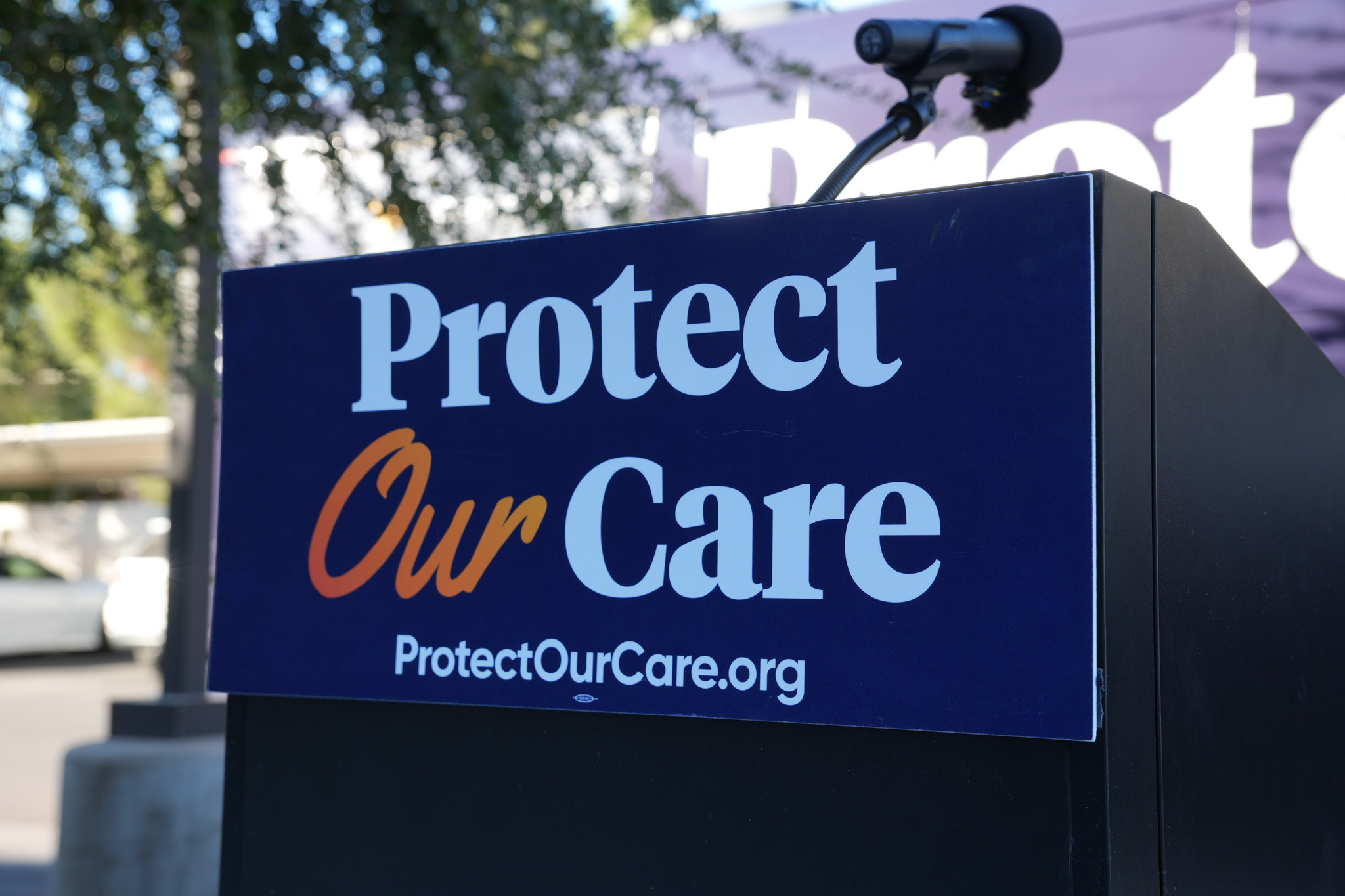
Senate Republicans just voted to pass their Big, Ugly Bill, moving the legislation forward to the House. The bill funds massive tax breaks for the richest people and corporations by cutting $1 trillion from Medicaid and the Affordable Care Act — the largest cut to health care in American history. Republicans just voted to rip health care from 17 million Americans including children, seniors, people with disabilities and serious illnesses, and hardworking families who don’t get coverage through their employers. Not only will this bill set back uninsured rates to a level not seen in 15 years, it will force hundreds of hospitals and nursing homes to shut down, causing layoffs and hurting local economies across the country.
Despite widespread opposition and polling that finds this bill is overwhelmingly unpopular across party lines, Senate Republicans voted it forward anyway. At a time when too many families already struggle to make ends meet, now is the time for so-called Republican moderates to stand up for hardworking Americans instead of billionaires, and reject such extreme health care cuts.
The Hill: Senate Megabill Marks Biggest Medicaid Cuts In History
- “Senate Republicans on Tuesday passed the largest cuts to Medicaid since the program began in the 1960s, a move that would erode the social safety net and cause a spike in the number of uninsured Americans over the next decade. The tax and spending bill is projected to cost more than $3 trillion during that time, but would be partially paid for with about $1 trillion in cuts to Medicaid. Almost 12 million lower-income Americans would lose their health insurance by 2034, according to the Congressional Budget Office… experts and health advocates say the CBO analysis confirms that despite Trump’s repeated pledges to only cut waste, fraud and abuse in Medicaid, the legislation would enact an unprecedented reduction in the program currently used by more than 70 million low-income Americans.”
NPR: Senate GOP Passes Trump’s Sweeping Policy Bill, Setting Up Decisive Vote In The House
- “The bill would extend the tax cuts that were passed by Republicans in 2017, preventing a potential hike in rates at the end of this year when the current provisions are set to expire. Republicans are offsetting some of those costs… with major changes to Medicaid, the joint federal and state program that provides health care for roughly 70 million low-income, elderly and disabled Americans. Early estimates suggest around 11 million people could lose coverage under the GOP bill.”
- “[Senator Susan] Collins wrote in a statement. ‘My vote against this bill stems primarily from the harmful impact it will have on Medicaid, affecting low-income families and rural health care providers like our hospitals and nursing homes.’”
STAT: Senate Passes Trump’s Tax-Cut Bill That Would Slash Medicaid Spending
- “Medicaid cuts make up the lion’s share of the estimated $1.1 trillion in health care spending reductions that help pay for the tax cuts… Altogether, the bill would enact the largest cuts to federal health care spending in history, and the most sweeping changes for the industry since the 2010 passage of the Affordable Care Act. The Senate bill would lead to 11.8 million people losing health insurance over the next decade, CBO said Saturday night, nearly 1 million more people than projections for the House’s version of the bill. The higher enrollment losses in the Senate version are the result of more aggressive Medicaid funding cuts than the House bill.”
Politico: Lisa Murkowski Says It Was ‘Agonizing’ To Vote For The Megabill
- “The Alaska senator slammed the breaks on the legislation overnight but ultimately voted to advance it after winning key concessions for her state…But Murkowski touted changes she secured to the Supplemental Nutrition Assistance Program that would allow for “greater flexibility” for Alaska and extra support for rural hospitals “that is going to be very key.””
Rolling Stone: Senate Republicans Pass Trump’s Bill To Strip Health Care From Millions
- “Senate Republicans have passed President Donald Trump’s so-called “Big Beautiful Bill,” a sprawling legislative package that is expected to kick millions off their health insurance, codify big tax cuts for the wealthy, give a massive funding boost to the administration’s mass deportation efforts, and screw over the nation’s poor with cuts to social services… The vote was 50-50, but Vice President J.D. Vance broke the tie. Republican Sens. Susan Collins (R-Maine), Thom Tillis (R-N.C.), and Rand Paul (R-Kentucky) broke with their party and voted no on the legislation. Tillis announced earlier this week that he would not be seeking reelection after Trump said he would work to primary him amid his opposition to the bill.”
Axios: Senate Passes Trump’s “Big, Beautiful Bill” After 11th-Hour Panic
- “The Congressional Budget Office estimates that the bill would add roughly $3.3 trillion to the national debt over the next 10 years… CBO also estimates the changes to Medicaid would result in nearly 12 million fewer people with health insurance over the next decade.”
- “It makes significant changes to the Medicaid program, including imposing work requirements and eventually lowering provider taxes from 6% to 3.5%.”
AP News: Senate Passes Trump’s Big Tax Breaks And Spending Cuts Bill As Vance Breaks 50-50 Tie
- “It would impose $1.2 trillion in cuts, largely to Medicaid and food stamps, by imposing work requirements on able-bodied people, including some parents and older Americans, making sign-up eligibility more stringent and changing federal reimbursements to states.”
The Guardian: Senate Republicans Pass Trump’s ‘Big, Beautiful’ Bill, Clearing Major Hurdle
- “To satisfy demands from fiscal conservatives for cuts to America’s large federal budget deficit, the bill imposes new work requirements on enrollees of Medicaid, which provides healthcare to low income and disabled Americans… ‘It is inescapable this bill will betray the promise Donald Trump made,’ Tillis said on Sunday. Pointing to a forecast that the bill would cost 663,000 North Carolinians their Medicaid coverage, Tillis said: ‘What do I tell 663,000 people in two years or three years, when President Trump breaks his promise by pushing them off of Medicaid because the funding’s not there any more, guys?’”
NBC News: Senate Republicans Narrowly Pass Trump Megabill After Marathon Voting Session
- “Voting against the final bill, alongside all 47 Democrats, were Republican Sens. Rand Paul of Kentucky, Thom Tillis of North Carolina and Susan Collins of Maine. Paul opposed the bill because it would add trillions of dollars to the deficit, while Tillis and Collins feared the cuts to Medicaid were too steep.”
- “It includes a surge of new funding… to carry out Trump’s immigration enforcement and mass deportation plans. It aims to pay for some of that with hundreds of billions of dollars in cuts to Medicaid…”
- “Rep. David Valadao, R-Calif., who represents a swing district, slammed the Senate bill’s more aggressive Medicaid funding cuts. ‘I’ve been clear from the start that I will not support a final reconciliation bill that makes harmful cuts to Medicaid, puts critical funding at risk, or threatens the stability of healthcare providers across CA-22,’ Valadao wrote on X over the weekend.”
New York Post: Senate Passes Trump’s Sweeping “Big Beautiful’ Agenda Bill, Sending It To The House For High-Stakes Showdown
- “After more than a month of deliberation, the Senate modified the House version of the legislation to extend business tax reductions, deepen cuts to Medicaid, [and] increase the debt limit by $5 trillion… leadership agreed to deepen cuts to Medicaid from the version that passed the lower chamber last month, assuaging [Speaker] Johnson’s concerns.”
Washington Post: Senate Passes Trump’s Tax Bill, Sending It To House For Final Passage
- “Sen. Ron Johnson (R-Wisconsin) repeatedly vowed the bill would not pass without deeper spending cuts. Instead, the Senate Finance Committee wrote a bill hundreds of billions of dollars more expensive than the House’s, and simultaneously more punitive toward Medicaid. That sent Tillis to the floor outraged with his party over he what he described as a ‘betrayal’ of constituents on the federal health insurance program. ‘The effect of this bill is to break a promise,’ Tillis bellowed Sunday on the Senate floor. ‘What do I tell 663,000 people in two years or three years,’ he added, ‘when President Trump breaks his promise by pushing them off of Medicaid because the funding’s not there anymore?’
IN THE STATES
Maine Public: Senate Budget Bill Passes; Healthcare Providers Say Patient Health Will Suffer If House Votes Yes
- “The Senate Budget Reconciliation Bill, passed Tuesday, eliminates Medicaid reimbursements to healthcare providers who perform abortions. It now goes to the House for a vote. The president and CEO of Maine Family Planning is warning that House passage of the Budget Reconciliation Bill will result in a delay or loss of services for MaineCare patients who will be forced to pay out of pocket for contraception and other reproductive care. A nonprofit, Maine Family Planning provides services to about 40,000 Maine residents, half of whom rely on MaineCare, the state’s Medicaid program.”
Maine Public: Sen. Susan Collins Opposes Trump Policy Bill, But GOP-Led Senate Passes It Anyway
- “In a statement, Collins said she supported the bill’s extension of the Trump tax breaks from 2017. But she said its Medicaid cuts would cost Maine $5.9 billion over 10 years, threatening the sustainability of the program, its 400,000 beneficiaries and the rural hospitals that treat them.”
CT Mirror: CT Senators Cite A ‘Catastrophe’ As Senate Passes Trump’s ‘Big Beautiful Bill’
- “…even some Republicans are raising concerns about the effects of the bill, as evidenced by GOP Sen. Thom Tillis of North Carolina saying he’ll vote no and deciding to retire amid Trump’s threat to back a primary challenger against him. Tillis pointed to the deep cuts to Medicaid that could hit his home state.”
- “To pay for these tax provisions, the bill includes steep spending cuts, which would have a direct impact on some safety net programs and state finances…The nonpartisan Congressional Budget Office, which analyzes and scores federal legislation, estimated that about 138,000 people could lose Medicaid coverage in Connecticut, with the higher end of enrollment loss up to 172,000. That estimate is based off of the House version of the bill.”
The American Prospect: Senate Passes Megabill as Murkowski Stays Bought
- “By the thinnest of margins, the U.S. Senate completed work on the One Big Beautiful Bill Act on Tuesday morning, after Sen. Lisa Murkowski (R-AK) decided that she could live with a bill that takes food and medicine from vulnerable people to fund tax cuts tilted toward the wealthy… Medicaid provisions that would have boosted the federal share of the program for Alaska didn’t get through the parliamentarian; even a handwritten attempt to help out Alaska on Medicaid was thrown out at the last minute.”
- “The wraparound amendment also doubled the size of the rural hospital fund to $50 billion. The Senate leadership’s initial offer on this fund was $15 billion. Overnight the Senate rejected an amendment from Collins that would have raised the rural hospital fund to $50 billion. Even at that size—which will be parceled out for $10 billion a year for five years—it hardly makes up for nearly $1 trillion in Medicaid cuts, which are permanent. The hospital system is expected to buckle as a result of this legislation, if it passes.”














